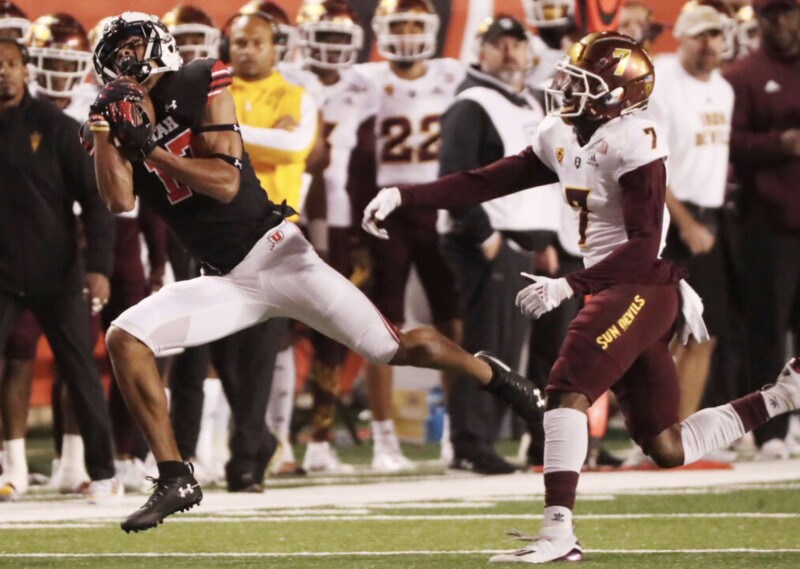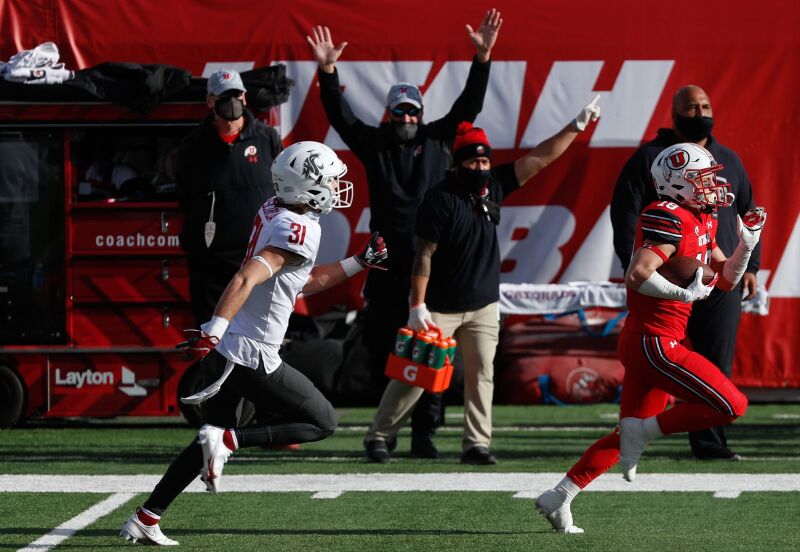The University of Utah football team has not been exempt from adversity over the last year. Its players have lost two of their teammates over the last year beginning with the death of Ty Jordan on Christmas Day 2020 and continuing with the murder of Aaron Lowe in September of this year. Many said the Utah Utes, a group of young men facing more grief than most had experienced in their lives up to this point, would be doing well to simply put on their pads and play. But after winning 9 of its last 10 games, the Utah football team will play on one of college football’s biggest stages—the Rose Bowl in Pasadena, California, on New Year's Day.
“You hope that a university prepares people for life, that it’s a microcosm of life’s experiences that people will face and you don’t want it to be easy. [But] I will admit to you, I did not want it to be this hard,” University of Utah president Taylor Randall, a member of The Church of Jesus Christ of Latter-day Saints said. “But they took what was given to them and they showed what could be made great out of deep tragedy. I think in my life I’ve never seen better examples of student, leaders, and coaches. …In some ways the only way you deal with tragedy is to turn to God and there are many, many faith traditions on that team that I think were brought to bear in getting this group through this tragedy. Kyle Whittingham says, ‘We’ll never get over it but we’ll get through it’ and I think they more than got through it.”
Britain Covey shared on this week’s All In podcast that football actually became secondary to the team.
“I think that the public loves to focus on how we went forward and won the Pac-12 Championship in honor of Ty and Aaron but that was so secondary in all of our minds, like football just became secondary at that point. Wins and losses didn’t matter nearly as much as honoring them with how we lived, with how we played, with what kind of bond we created,” he said.
Covey said a turning point for his team came when Aaron Lowe’s mother, Donna Sterns, came to visit her son’s teammates a few days after his death. She told them that they had “permission to go forward” and expressed that she wanted them to live their lives and be happy.
Since Lowe’s passing, the Utes have lost just one game, but perhaps the thing they will look back on with the most gratitude is how their team came together and how its diversity proved to be a strength. President Randall says that the team’s diversity represents what is best about the state of Utah.
“This stage, [the Rose Bowl,] is so enormous for both the University of Utah and the state of Utah,” he said. “I think what’s wonderful about the composition of our football team is it represents what’s best about this state: it is both the diversity of the state but also representative of the history of the state and the religion that was founded and headquartered here, and those [Latter-day Saint] athletes are fantastic leaders on our team.”

When asked about the number of returned missionaries, which based on the athletics website includes at least 20 of the team’s players, Randall added, “Many of them do serve missions and they bring back with them those life experiences that help lead teams. They bring back with them a resilience and a perspective that particularly this year is quite poignant.”
Covey, who served a mission in Chile, agrees that the experience of returned missionaries is an asset to his team.
“The stability that a lot of returned missionaries bring to a team is invaluable. You can’t just fake that. So if I were to recommend anything to a coach, I’d say, ‘Find some returned missionaries that bring you that perspective and that kind of stability to a room.’ So they have brought a lot of, I think, stability, especially through this year,” Covey says, before adding the caveat that returned missionaries are not perfect. “But I do think that two years of trying to give some selfless service, it helps you develop skills that you just can’t…do in a snap of a finger.”
The Rose Bowl game against Ohio State will mark the last time Covey will don the Utah uniform and he can’t think of a more perfect ending to his collegiate career and his faith plays into that.
“I’ve always hoped that I could represent the Church well in any way. I always hope that I can represent Christ well and just be a light. And I know that I’m not perfect at that but I’ve always tried to, especially throughout my career because I…know a lot of times people have misconceptions about the Church,” he says. “And that’s one of my things that I’ve tried to do is to break down the misconceptions and those barriers and say you can be so normal and fun and happy as a member of the Church…but also you are so dedicated to what you believe and not shy about it.
“I think people are really attracted to that so I hope I’ve done a fine job of representing Christ and the Church and I will my whole life.”
See below for a list of other returned missionaries (with location of mission if known) on the University of Utah roster:
Carson Danner- Raleigh, NC
Hayden Erickson- Rancagua, Chile
Cole Fotheringham- Nicaragua
Nick Howe- Chicago, Illinois
RJ Hubert
Devin Kaufusi - Alpine, Germany
Jaren Kump- Brazil
Lolani Langi
Taka Lautaha- Cauayan, Phillippines
Hunter Lotulelei
Johnny Maea
Gavin Nawahine- Samoa
Ali’i Niumatalolo- Chile
Simote Pepa
Fua Pututau
Hauati Pututau
Tennessee Pututau
Miki Suguturaga
Mika Tafua- Tacoma, Washington
Junior Tafuna- Praia, Cape Verde
Devaughn Vele- Samoa
Aliki Vamahi


